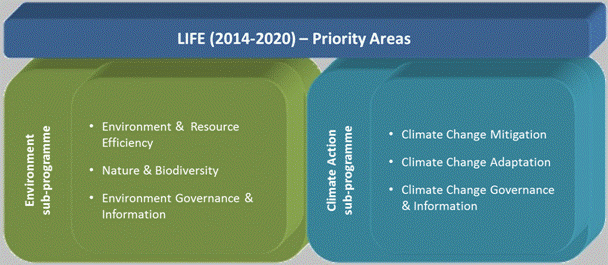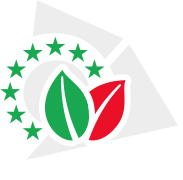Discover LIFE+ programme
The LIFE programme is the EU’s funding instrument for the environment and climate action. The general objective of LIFE is to contribute to the implementation, updating and development of EU environmental and climate policy and legislation by co-financing projects with European added value.
In over 20 years of the LIFE programme, the European Commission has provided funding for nearly 4 180 projects all over Europe, including 69 Polish projects. The current LIFE programme is a continuation of the LIFE + financial instrument functioning in 2007-2013.
The scope of the LIFE program and the specific objectives of the priority areas are displayed in the diagram below:

LIFE
Priority areas:

Environment and resource efficiency
- innovative technologies that meet the challenges of the environment, including the links between environment and health, as well as supporting policies and legislation on resource efficiency, including the "Roadmap to a Resource Efficiency Europe";
- plans and programs in line with EU policy and legislation on the environment, mainly in the areas of water, waste and air;
- to improve the knowledge base for the development, implementation, assessment, monitoring and evaluation of Union environmental policy and legislation, and for the assessment and monitoring of the factors, pressures and responses that impact on the environment within and outside the Union.

Nature and biodiversity
- to contribute to the implementation of the Birds and Habitats Directives and the Union Biodiversity Strategy to 2020, by applying best practices and solutions;
- to support the further the development, implementation and management of the Natura 2000 network;
- to improve the knowledge base for the development, implementation, evaluation, monitoring and evaluation of Union policy and legislation on nature and biodiversity.

Environment governance and information
- to promote awareness raising on environmental matters, including generating public and stakeholder support of Union policy-making in the field of the environment, and to promote knowledge on sustainable development and new patterns for sustainable consumption;
- to support communication, management, and dissemination of information in the field of the environment, and to facilitate knowledge sharing on successful environmental solutions and practice, including by developing cooperation platforms among stakeholders and training;
- to promote and contribute to more effective compliance with and enforcement of Union environmental legislation, in particular by promoting the development and dissemination of best practices and policy approaches;
- actions for better environmental governance by increasing the involvement of stakeholders, including NGOs, in policy consultation and implementation.

Climate change mitigation
- to support the implementation and development of Union policy and legislation on climate change mitigation, including mainstreaming across policy areas, in particular by developing, testing and demonstrating policy or management approaches, best practices and solutions for climate change mitigation;
- to improve the knowledge base for the development, assessment, monitoring, evaluation and implementation of effective climate change mitigation actions and measures and that enhance the capacity to apply that knowledge in practice;
- to facilitate the development and implementation of integrated approaches, such as for climate change mitigation strategies and action plans, at local, regional or national level;
- to support the development and demonstration of innovative climate change mitigation technologies, systems, methods and instruments that are suitable for being replicated, transferred or mainstreamed.

Climate change adaptation
- to support the efforts leading to increased resilience to climate change
- to improve the knowledge base for the development, assessment, monitoring, evaluation and implementation of effective climate change adaptation actions and measures, prioritising, where appropriate, those applying an ecosystem-based approach, and to enhance the capacity to apply that knowledge in practice;
- to facilitate the development and implementation of integrated approaches, such as for climate change adaptation strategies and action plans, at local, regional or national level, prioritising, where appropriate, ecosystem-based approaches;
- to support the development and demonstration of innovative climate change adaptation technologies, systems, methods and instruments that are suitable for being replicated, transferred or mainstreamed.

Climate governance and information
- promote awareness raising on climate matters, including generating public and stakeholder support of Union policy-making in the field of the climate;
- to support communication, management, and dissemination of information in the field of the climate and to facilitate knowledge sharing on successful climate solutions and practice, including by developing cooperation platforms among stakeholders and training;
- to promote and contribute to more effective compliance with and enforcement of Union climate legislation
- actions for better climate governance by increasing the involvement of stakeholders, including NGOs, in policy consultation and implementation.
Types of projects
Within the current financial framework LIFE Programme 2014- 2020, it is possible to receive funding, apart from the traditional projects - similar to those in previous frameworks of LIFE Programme.
Projects must fall within the scope of the program and at the same time fulfil adequately the project conditions such as: demonstration, pilot, applying best practices, and information depending on the selected subject area.
LIFE funding and implementation rules
The program is managed by the European Commission, which annually announces calls for proposals. Applicants may apply for funding from the European Commission on the implementation of projects with 60% of eligible costs, and in the case of projects aimed at the natural species and habitats with a priority funding rate up to 75%. The National Fund for Environmental Protection and Water Management can contribute financially in the implementation of the project within the framework of the priority program "LIFE Co-financing". LIFEcogeneration.pl received financial support under this mechanism.

